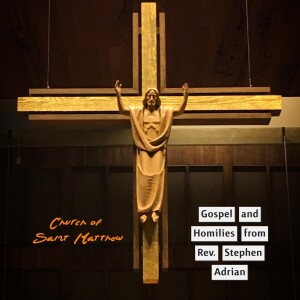
Wednesday Apr 19, 2023
10.25.2020 Homily
Judaism is a religion that is highly contained within the law. The observance of the law is the sign of holiness. The observance of the law is a sign of one's commitment to God. And while there are some major laws, there are so many minor laws as well, over 600. And the Pharisees were people who really were focused on the law. And they really wanted to hold people accountable to the law, a law that was almost impossible to observe because it was so broad, so wide, so multiple, that a human being would find it really difficult to keep it straight.
So when this student of the law comes to Jesus. When this gentleman asks Him, "What is the greatest commandment?" he's asking, "Of all of this, what is the hook we hang all of this on? What is the central piece of all of this?" And Jesus gives the answer, the answer which is for the Jew, the Shema. It's the statement of the creed. Hear oh Israel, I, the Lord and Lord alone, you shall love the Lord with all your mind, all your heart, all your soul and all your strength. That's the Shema. That's the creed which expressed the heart of faith of the Jew.
If you visit a home of a Jewish family, you will notice that as you go into the house there is a little box on the door. And the Jew will touch that box before he goes into the house and he will touch his forehead and his lips. And as he's leaving the house, he'll do the same thing. He'll touch that box and his forehead and his lips. And in that little box is a small piece of parchment on which the Shema is written. Hear oh Israel, the Lord your God is Lord alone. You shall love the Lord with all your mind and heart and soul and strength. And what it means is that I pray that my mind, my head might embrace that truth and know it. I pray that my lips, my senses, may express that truth.
Well, Jesus goes one step further, and he says there really is a corollary to that command. That the manner in which I demonstrate my love for God is really the way in which I care for my neighbor. And that I'm called to love my neighbor in the same way that I would want to be loved. I would do for my neighbor, exactly what I would want others to do for me.
Now the question is, who's my neighbor? And in St. Luke's gospel that question is raised to Jesus and Jesus tells the story of the good Samaritan. You see among the culture of Jesus' time, people saw neighbor as being the tribe, the community, the family, that very defined familial grouping. And Jesus says it's got to go beyond that. It's got to go beyond between your cousins and your aunts and uncles and your relatives and your next door neighbor. It's got to go beyond that. And as we heard in the first reading from the book of Ezekiel, that the immigrant, the traveler, the foreigner is to be seen as my neighbor. That I am to love that person truly as much as I would expect to be loved. As I would care for that person, as I would expect to be cared for. That person may look differently than I do. That person may be of different color. That person may be of different ethnic body. That person may be of different religion. That person may think differently, speak differently, act differently. None of that, none of that absolves me from the responsibility of loving that person in the way I would want to be loved.
Going further in that reading from the book of Exodus, God says to the people of Israel that you are to make room for the orphan and the widow, not just within your family, but all through the creation. That the orphan and that widow, the unprotected, those who have no name and no face, and those who have no power, you are to treat them as you would want to be treated.
So the call to love one's neighbor is really the call to demonstrate one's love for God in the way in which we treat each other. St. John will say, "How can you say that you love the God whom you do not see, when you cannot love your neighbor, who you do see.”
As we pray today, we pray that our hearts may be opened and our minds may be opened, so that we might be able to embrace that truth in our own lives and encourage others by our action to live that truth--love of God and love of neighbor.
No comments yet. Be the first to say something!